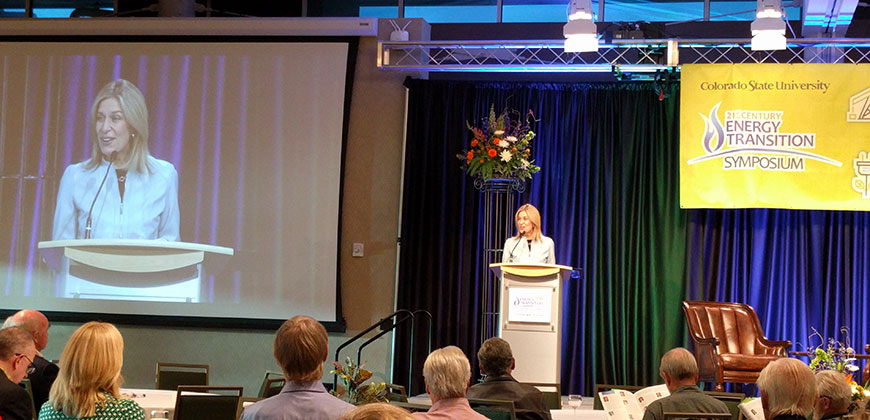
Department of Energy Deputy Secretary Elizabeth Sherwood-Randall delivers the evening keynote at the 21st Century Energy Transition Symposium, Sept. 28.
The 21st Century Energy Transition Symposium, Sept. 28-29, drew academia and industry together at Colorado State University to discuss problems and solutions spanning all energy sectors. The symposium was co-hosted by the CSU Energy Institute and the School of Global Environmental Sustainability.
The sixth annual event, formerly the Natural Gas Symposium, featured Department of Energy Deputy Secretary Elizabeth Sherwood-Randall as its keynote speaker Wednesday evening.
Keynote address
Sherwood-Randall, second in command at the DOE, shared a broad overview of the agency’s successes and long-term goals. She clarified what the agency means by “clean energy,” which makes most people think only of wind, hydropower or solar, she said.
Clean energy technology, she said, includes carbon capture and storage for fossil fuels, new nuclear technology, better transmission infrastructure, and advanced manufacturing. It also includes technologies that decrease water usage while increasing energy efficiency overall. This is critical, in that the U.S., like many countries around the world, will need to use an energy mix that includes fossil fuels for many years to come.
“We’re pursuing and supporting cutting-edge research and new technologies that will enable us to continue to use our domestic fossil fuel resources while also cutting emissions,” Sherwood-Randall said. “Meeting our global climate and energy goals means that global greenhouse gas emissions must be deeply reduced by 2050. And achieving a deep decarbonization will require a major transition in our energy systems focused on systematically reducing emissions across all sectors.”
Bill Ritter, director of CSU’s Center for the New Energy Economy and former governor of Colorado, led a question-and-answer discussion with Sherwood-Randall following her remarks.
EV charging challenge
Beyond sessions like “Climate Change 101;” “Mega Trends in Energy Sources;” and “Energy Transitions in the Western United States,” the symposium included announcing the winner of the Innovate Fort Collins Electric Vehicle Charging Challenge. The winner was Qmulus, an emerging technology company.
The competition was a joint effort by the City of Fort Collins, the Rocky Mountain Innosphere and CSU. Competitors focused on alleviating pressure on charging loads that affect the electric grid due to increased use of electric vehicles.
Qmulus won the competition for its plug-and-play adapter, which connects between electric vehicle supply equipment and plug-in electric vehicles. The adapter gives users with low-end charger stations the ability to network their charge sessions without going to the expense of upgrading their supply equipment.
Live stream archive
An archive of the live stream will be available at the symposium website at a later date.